#i am trigued
Explore tagged Tumblr posts
Text
i just -
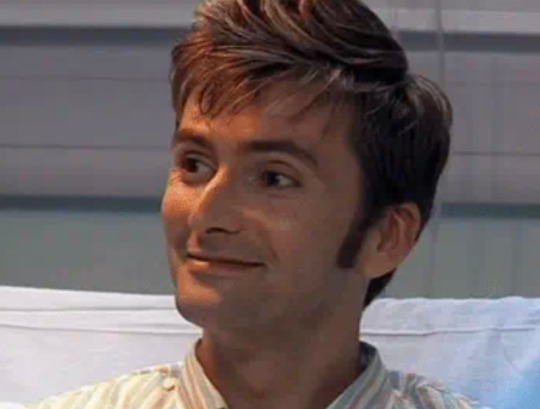
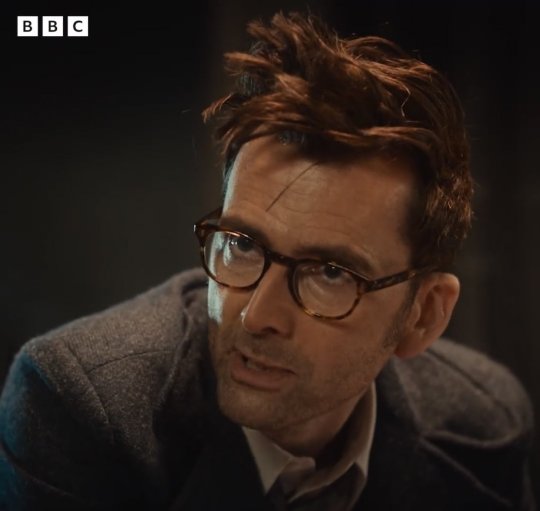
i -

#doctor who#david tennant#10th doctor#tenth doctor#14th doctor#fourteenth doctor#tenthree#60th anniversary#sir what is your secret#he he he's so -#so#i -#that's a niiiceeeee 51#pictures are 18 years apart#finally made it to barcelona#seriously why is he so tan here compared to other shots?#i am trigued#i've been asking for martha bacm but it's probably for the best if she isn't because i think she might faint#those feelings would come rushing back boiiiiii
21 notes
·
View notes
Note
Ed frowned, worried. He wished he could promise Tron he would be okay, but he honestly wasn't certain any more. "I'm not sure, either," Ed admitted. "My guess is it has something to do with whatever the laser translated the issue as, but... I'd need to look into the laser's code, figure out what it translated the issue as... At the very least."
He hesitantly lay a hand on Tron's shoulder, wishing he could do more for him. "I'm sorry," he said softly. "Is there anything I can do to help you be a little more comfortable?"
[...This has been living rent free in my head for a while, but I know we have a lot of threads... up to you what to do with it. For Tron, from alternatively, send in " how long was i out for? " for the sender, having woken up on the receiver's sofa/bed/spare bed, to greet the receiver after showing up on their doorstep earlier with serious injuries and in a weakened state.]
Ed hadn't expected to wake up again when he passed out in the barren wilderness beyond the city. Whether it had been from the blood loss, or cold, or exhaustion, or the concussion he absolutely got from crashing that jet that had done him in, he wasn't certain.
In hindsight, the jet was a terrible idea. He didn't know how to pilot the thing, and unfortunately his pursuers did. All he knew was he did not want to die in those wretched games, and the jet baton he was a way out.
Ed squinted up at the harsh white lights, and the blurry face scowling at him that he recognized, but had never seen so young.
...He was dead, wasn't he?
"...Alan...?" Ed asked. "How long...?"
Tron's near constant scowl shifted ever so slightly. He hadn't heard the name of his User since he was brought to this Grid - nor had he seen a User other than Flynn on any Grid. Clearly, though, Ed was a User. The red liquid User voxels proved that much.
The shock of hearing his User's name affected Tron more than he thought, because whatever he was about to say died before he could even open his mouth. So he furrowed his brows and crossed his arms. He had to say something, even if it wasn't what he was originally thinking about.
"Long enough." He absentmindedly scanned Ed for improvement in his healing - only to get errors. Right. User.
"The portal back to your world is closing, we don't have much time." He just hoped Users could heal as quickly as programs, because dragging around a wounded User would be quite difficult.
#oh? am i trigued now...#poor Tron#he needs all the hugs#and a warm fuzzy blanket#and idk a mug of hot chocolate or tea or whatever his comfort drink is
144 notes
·
View notes
Text
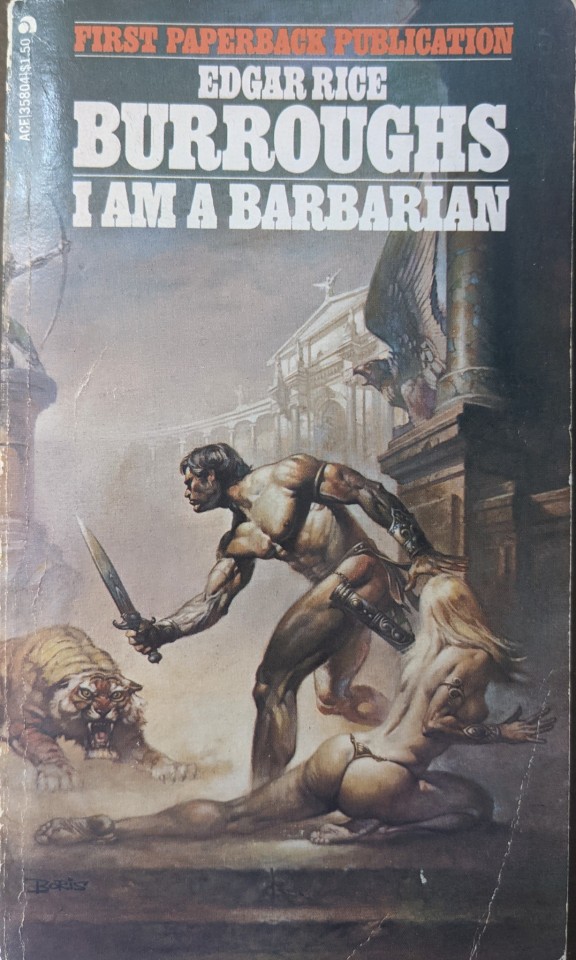

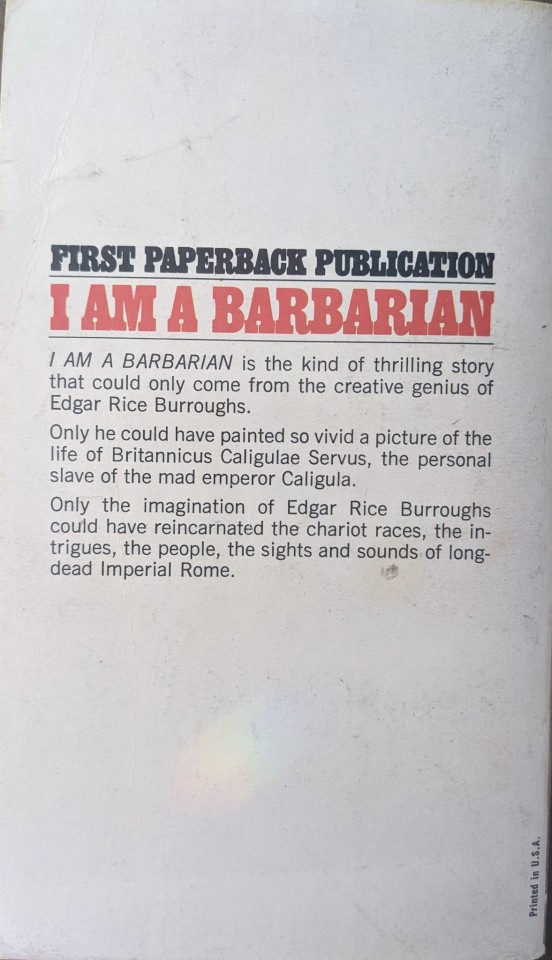
I am a barbarian. Edgar Rice Burroughs, 1967. Cover art uncredited. Back text reads: "FIRST PAPERBACK PUBLICATION I AM A BARBARIAN
I AM A BARBARIAN is the kind of thrilling story that could only come from the creative genius of Edgar Rice Burroughs.
Only he could have painted so vivid a picture of the life of Britannicus Caligulae Servus, the personal slave of the mad emperor Caligula.
Only the imagination of Edgar Rice Burroughs could have reincarnated the chariot races, the in trigues, the people, the sights and sounds of long dead Imperial Rome."
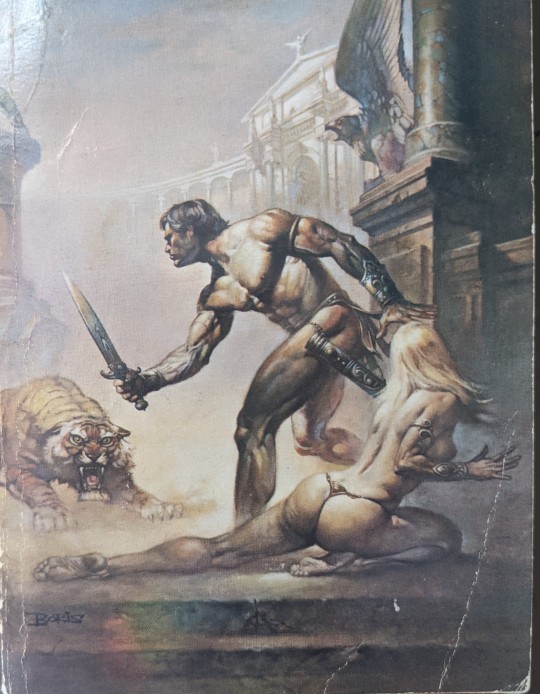
#i am a barbarian#edgar rice burroughs#barbarian#adventure#science fiction#aesthetics#book#art#scifi#book cover#retro scifi#old books#vintage
2 notes
·
View notes
Note
Yeet Anon here again and 1. Nice drawing of Pikemen, love it XD 2. Do you wanna know about my PunkBarkeepMax! Au cuz I think it has Maxneil potential and I love it 😐💕❤️🌈
tell me more....i am in trigued
1 note
·
View note
Note
aquarius, gemini, cygnus?
Greetings Brian!! 😃😃😄 Thank you for asking! Wishing you the best, mec! And I'm sorry for the late response! Just had to unpacked around here (here's an hot intrigued Maxence)😅🤗🍀💫

aquarius: name 3 things you like about yourself.
Wow! 😵 Talk about talking overcoming my low self esteem. 😤 Oh well, I'll try to be kind to myself…
1.I like my mind. Not when it's being an asshole to me but when it behaves itself and lets me use my creativity to create something. Like drawing, editing, and writing. That's when I really am alive! Like can do anything 😆☺️
2.I think my humor has saved me from being received as a cold hearted bitch on many occasions. And you're probably wondering what are you talking about?? Lmao it's just much easier for me to be ME online than in real life? Who knew😅 People tend to be more intimidated by me so when I turn on the charm and sarcastic humor, it really makes me more approachable.
3.My compassion. I would like to think I'm a good person who's not perfect but is always trying to help others and improve upon myself whenever I mess up and has done something I didn't think would affect others. It's a learning process to understand people and to understand yourself.
gemini: name the first song that comes to mind.
Fallin' Out - Keyshia Cole
🤣😅 It was the last song I've listened to so I think it's still stuck.
cygnus: do you believe in reincarnation?
Eeeeehhh...Having been affiliated with Buddhist people in my life. I have heard and seen all about reincarnation ordeal from Buddhist perspectives. Do I personally believe in it? No, I don't. I'm not a religious person but I find ideas of people having another chance at another life to be comforting. (Only if you have good karma though, bad karma means you will be reincarnated to something less than human which makes me go🤔😐🤨)
…
Okay! That about wraps it up! Thank you asking me Brian! I hope you enjoy the rest of your day or a nice evening! 💫😌🍀
—Gao🌲
#ajsjdkdkdkf thank you mec!!#this was harder than I thought#but it was really fun#😘💕💕💕💕#awesome people tag#ask response#personal
1 note
·
View note
Note
Have you ever watched BBC Gormenghast? Is only 4 episodes long and it's tragic vxh(TM). The closest thing I can think of is Reylo because they are both so alone and so similar in different ways. Steerpike is fun at his maliciousness, sympathetic at his philosophy and a lost puppy at his love. He is also played by Jonathan Rhys Meyers, so... Should warn you foremost that Gormenghast resembles Alice in Wonderland; all the characters seem kid of crazy and act over the top. They make it worth it doe
i am,,,,, IN TRiguED
#to watch#ask#ps....have u heard of lotura.......it's zutara 2.0 in the making and i can sniff some dramatic enemies as lovers coming up soon :)
2 notes
·
View notes
Text
I also have never seen Discovery, so I am i trigued by your statement that Ethan Peck is the only portrayal of Spock that is honorable to Leonard Nimoy (I simply have not read/heard this before now). Would you care to elaborate as to why?
Though I’ve never seen Discovery, Ethan Peck is the only portrayal of Spock that’s honorable to Leonard Nimoy
30 notes
·
View notes
Text
@ellieofmidnight i was listening to tenacious d throughout the entirety of writing this
enjoy being old enough to drink and vape in the land of burgerbeachland, usa
also hint = clue (the game)
“Ian!”
The guy in question turned in his crappy seat on the crappy school lunch benches to stare at his musical friend, who was jogging towards him with a suspiciously large grin on his chiseled jaw.
Not as chiseled as Paul, the jaw god, but close enough. Maybe. If jaw classifications were baseball leagues, Paul would definitely be in the major leagues. Hard to beat Babe Ruth at jaw chiseling.
Ian blinked. Something about Luke really got him rambling, it seemed.
“What?” He declared irritably, stabbing at his plate with a strange utensil one could only describe as a sporkife.“I was in the middle of important pasta matters.”
Unfortunately, Luke hadn’t heard his half-sarcasm as he had only then removed his blasting headphones and hung them rather stylishly off his neck. Ian cocked his head as he caught some snippets of the song before Luke switched everything off.
Something about squeezing and saying please…?
Ian raised an eyebrow, taking careful note of the action so he could keep it suspended for the appropriate amount of time for skepticism and intrigue. Possible music shaming would have commenced had Luke not plopped down next to him and immediately shoved a question into his ears.
“Forget the awful and boring school food,” Luke purred as he snaked an arm around Ian’s shoulder. “How about we go back to my place? I’ve got board games.”
Ian leaned back so Luke could get the full blast of his neutral expression. Unfazed, that’s how he rolled.
“Is that some kind of euphemism?”
Ian had to duck to avoid the spray of musician spit from the hat wearing funkman as he blew a derisive raspberry.
“I thought moose lived in Alaska or something, not in the gutter.” He boomed out a laugh at his dumb joke before continuing. “I have loads of cool stuff, like Hint.” Luke wiggled his eyebrows. “You like Hint, don’t you Ian?”
Ian grumbled but his growing smile betrayed him. “I like Hint.”
“You like those thinky games, the ones where you have to sleuth stuff. The moose of intrigue, they should call you.” Luke’s eyes lit up and Ian forced down the urge to headbutt him and run. “They should call you...Iantriguing.”
Ian frothed at the mouth, his allergies to horrible wordplay threatening to dissolve his insides like acid. His suppressed sarcasm was becoming a poison, one that melted the crap out of everything he loved, but he endured, lest he turn that poison on the things he loved in the outside world.
He’d let acid destroy him from the inside out as long as Luke’s smile could be preserved, loathe as he was to admit it.
“You know, I’m killing myself for you.”
“What?”
“Nothing. Do you have Good Rodents?”
Luke yanked his hat over his eyes jokingly, nearly stumbling into a wall as Ian watched on. “No one has that horrifying nightmarefest except for you, my friend.”
“It’s a complete masterpiece. Sorry you doubt its glory.”
“That’s not even a board game.” Luke swatted at Ian with his trusty hat. “Let’s just hurry to my dorm, okay? Before I have to sit through your weird gaming experiences.”
A pause.
“That was an invite to invite me to your dorm so I can totally sit through your weird gaming experiences. Please.”
Ian waved a hand.
“We’ll see.”
Ian stood in front of Luke’s dorm door as the latter unlocked his door.
Luke threw open his door with a flourish and a bow, jumping back in fear as it banged against the door stop with such a force that it slammed shut again from the rebound force. His bravado and enthusiasm were doused as he fished out his key again, blushing and apologizing to a few people who poked their heads out in the hall, angry at the loud noise.
Ian smiled as he was ushered inside, happiness flooding his senses for no discernible reason. He turned towards Luke to see a similar expression on his face, albeit with more obvious adoration.
“There’s something stuck in your teeth, Luke.”
Luke’s smile fell for but a moment before it returned. He held his arms bashfully behind his back as he shimmied in place. His specialty shimmy. This couldn’t be good, thought the intelligent and beautiful mooseman.
“Do you think...you could get it out for me?”
Ian dug through that sentence before Luke had even finished, taking the words “get” and “out” and putting them into action as he speed walked to the other end of the room.
“Wait!” After attempting to parkour off the wall, Luke, covered in dirt, scratches, and bad decisions, skidded to a halt in front of Ian. “Okay, okay, no team exercises. Let’s just get to investigating alright?”
He reached below his bed and pulled out Hint’s box. Unfortunately, a silver fish had been on the top and Luke dropped it like a stone, the box exploding open and the contents falling every which way.
They both sighed and began picking everything up, Luke throwing a piece at Ian.
A fatal mistake that soon turned into more piece flinging.
The chosen sport of true champions.
“This is kind of a mess of a first date, isn’t it?” Luke said as rolled the only remaining dice left.
“Don’t worry, everyone and everything’s a mess all the time. Messes can be great.”
“A motivational speaker, you ain’t.”
“Shut up and guess the murder weapon, before it turns into this game board. With the victim being you.”
Luke fell back dramatically. “The horror!” He threw an arm in the air as he bent backwards like a gymnast. Like someone who grinds at 4 am.“It was Ian, in the dorm with the game board.” He sat back up and pulled down the shirt that had began to creep up his stomach, giving someone who may have been watching an excellent view.
“Coincidentally, that may or may not be the title of my next hit single.”
Ian hurriedly switched his attention back to the game. “Be sure to pay me 70/30 of the profits then. You can’t use my likeness without paying me royally.”
“It’s worth it.”
Ian swallowed hard at his sincerity and leaned against Luke’s shoulder. “Let me see your
“Double detectives!” Luke placed a well-coordinated smooch on Ian’s lips before jumping up and sweeping up the board and all its pieces in his arms. “Watch this—!”
With a shout, he threw the bundle of game against his bedroom wall with muscles practically bursting forth with effort, the pieces smacking against the cheap drywall and flying all over the room. The cards fell into an anticlimactic pile as the board hit the wall and frisbeed right to Ian, the sharp rotating deathtrap cutting off a snippet or two of hair before falling onto the floor with a loud slap.
Ian stared at this mess of pieces and cards and simply gently fell backwards onto the hardwood.
A snort escaped him before he could stop it and he covered his face with his hands. He closed his eyes and curled into a ball, laughing into his knees at the absurdity of it all with tears pricking at his eyes.
He heard helpless laughter and heard a dull thump as Luke fell onto the floor beside him. Ian dared to raise his face to wipe away his tears of mirth, stealing a glance at the ball of sunshine beside him.
Luke’s face was flushed pink and his eyes were screwed tight as his mouth froze in choked laughter.
Ian would only admit it after 12 cups of coffee, about the point where he forgot the meaning of the word filter, but it was the most beautiful thing he’d ever seen.
#happy fucking birthday ellie!!!#i adore you to pieces#thanks for always being an amazing person and friend#you're the best and i love you#so have some gays#papa bless#also sorry its so short ahhh i just wanted to jam pack a sweet little fucking capsule of gay#there will be more good shit in your future you wonderful fuck#also ellie deserves the world woohoo!!#brutaltown#yungmoose#asagao academy#fanfic#poketin fics#this was based off an old prompt request that she sent me that i never got around to gomen gomen ;w; <3
7 notes
·
View notes
Text
the hippie phenomenon

“The New Yorker has always dealt with experience not by trying to understand it but by prescribing the attitude to be adopted toward it. This makes it possible to feel intelligent without thinking, and it is a way of making everything tolerable, for the assumption of a suitable attitude toward experience can give one the illusion of having dealt with it adequately.”
—Robert Warshow, "E. B. White and the New Yorker"
I wanna take issue with Kerouac and Didion, not so much with their writing’s literary value but as cultural criticism. Chance aside, a prerequisite of good criticism as I see it is a penetrating, upper-percentile comprehension of the subject at hand, coupled with an epistemic humility sufficient to the task of staying open-minded. Both Kerouac and Didion, though they represent opposite sides of the cultural and political coin, seem most primarily in judgment of their subjects, rather than intrigued by them. Both their practices show a dedication to deduction over induction, which is to say the opposite of learning. There is little demonstrated effort to adequately reconcile their worldviews, motivations, and values with that of an other (in Kerouac’s case, PTA moms and nuclear families; in Didion’s, the acidfreaks of Haight-Ashbury). Any good lawyer will tell you, if you don’t adequately understand your opponent’s position, your rebuttal will follow in inadequacy, cf. Ideological Turing Tests.
Here's Kerouac in My Woman describing a job application (one implication being that the American laborer is a drone, a zombie, whose guise Jack and his friends must take on to get hired):
We entered [the office] with our arms stretched out in front of us [drunk] like the zombies we'd seen in a picture the other day; we made our feet go slow and automatic like the ghost of death. We asked the man for a job. The poor idiot said, 'I don't think you boys will do.' We got out of there... laughing at the top of our lungs.
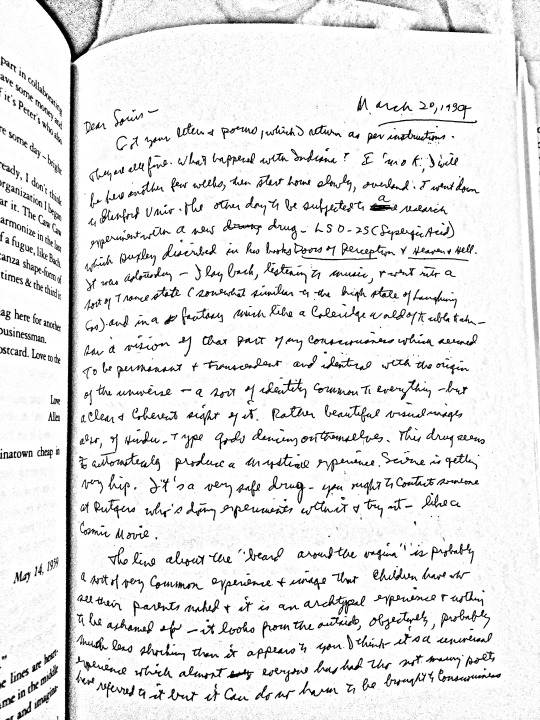
2.
As the 50s turned into the 60s, the Beat ethos into flower power, Kerouac drifted into Long Island alcoholism; Ginsberg adapted, stayed relevant. The transition between decades bridged by the Merry Pranksters’ cross-country quest to "tune out, drop out" in a refurbished 1939 school bus per Wolfe’s Electric Kool-Aid Acid Test.
On assignment for The Saturday Evening Post, Joan Didion traveled to the Haight-Ashbury district of San Francisco, where she saw posters of Ginsberg hung on the walls and devotees treated his opinions on the Krishna as of equal authority with the Swami. Didion saw a world falling apart, spiritually and socially in crisis. People forget, so it's worth reminding that Didion was not a progressive in this era. She was a National Review contributor and a Goldwater voter. And while I have no problem with her political conservatism, it’s important to link “Slouching” with the general moral hysteria over longhairedness taking place at the time, a hysteria which contributed in large part to Nixon's presidential and Reagan's gubernatorial elections.
The central argument (or assumption, or presumption of “Slouching” is that San Francisco is home to a generation of children (some literally, some relative maturity) who have embarked on an extended bad trip (either literally or figuratively) from which they may not ever return. Affectless and out-of-it, they show emotion only when discussing, acquiring, or ingesting narcotics (peyote, acid, smack, crystal, amps, and a now-mysterious “STP”). “Pathetically unequipped" for the real world, they lack any serious political convictions or critical thinking abilities, instead swimming in self-delusion and macrobiotic diets.
I can't speak of Dideon's intent so I'll stick to her prose, sociopathic in its lack of empathy and interest. The essay’s divided into bits so that each section sports an ominous closing sentence cum punchline-zinger. Interviewees divide into strawmen or caricatures; none are depicted or explored as complex, flesh-and-blood human beings. Juvenile delinquents and drug dealers are picked as the primary representative spokespeople of a sizable neighborhood and subculture. There’s Debbie, 15, a runaway because “[her] parents said she had to go to Church.” There’s John, 16, who has left home because his mother “didn't like boots” and made him help out around the house: “Tell about the chores,” Debbie says. John: “For example, I had chores. If I didn't finish ironing my shirts for the week I couldn't go out for the weekend. It was weird, wow.” Shortly after her wide-eyed relay on chores, Didion recounts Debbie literally chipping a nail, then getting upset that the author isn't carrying extra polish on her. I'd say you can't make this stuff up, but I'm tempted to invoke Richard Bradley:
Some years ago, when I was an editor at George magazine, I was unfortunate enough to work with the writer Stephen Glass on a number of articles. They proved to be fake, filled with fabrications, as was pretty much all of his work. The experience was painful but educational; it forced me to examine how easily I had been duped. Why did I believe those insinuations about Bill Clinton-friend Vernon Jordan being a lech? About the dubious ethics of uber-fundraiser (now Virginia governor) Terry McAuliffe? The answer, I had to admit, was because they corroborated my pre-existing biases. I was well on the way to believing that Vernon Jordan was a philanderer, for example—everyone seemed to think so, back in the ’90s, during the Monica Lewinsky time.
I can't say whether Didion fabricated these stories. It doesn't matter either way. A piece which confirms existing biases of its readers, or which confirms its own initial biases at its start, doing little more than elaborate variations on a stereotype for thousands of words, is poor criticism and shoddy historiography.
A generic structure for a given section of “Slouching”: observe events unraveling around her, hazard a guess at (and editorialize heavily on) what is occurring, entertain the possibility of asking a participant or knowledgeable observer for more accurate information, and then—inexplicably—decide not to. In other words, there’s a lack of respect for her subjects’ subjectivity, or for her own ability to be wrong. Equally as incredible as this journalistic practice is Didion’s willingness to admit to it (and in the same breath berate Time and other publications for their own misunderstandings of the hippie phenomenon).
Didion gets haughty at points, seamlessly transitioning from picking on a teenager’s amateur poetry to a bout of philosophical reflection:
As it happens, I am still committed to the idea that the ability to think for one's self depends upon mastery of the language and I am not optimistic about children who will settle for saying, to indicate that their mother and father do not live together, that they come from a “broken home.”
For myself, I’m not so hot about the idea of a journalist who dedicates forty pages to belittling literal teenage runaways, especially when so many avenues of more substantial cultural interest are ignored. It’s off-handedly mentioned that McLuhan is read by many in the Haight community, as are the Hari Krishna and the writings of Zen Buddhism, but Didion never meaningfully pursues any of the community's beliefs.
3.
Some of the more interesting documents on this subject come from the exchanges between literary, Cold War liberal moderates and the generation of beatniks and hippies who were pulling the country toward a more radical vision. Adam Kirsch’s Why Trilling Matters charts the relationship between Lionel Trilling and his former student at Columbia, Allen Ginsberg. (Kirsch, drawing on Trilling, distinguishes between the Blakean and Wordsworthean impulse, Wordsworth a “representative of wisdom,” Blake as the blazing voice of passion. As Trilling writes, Blake's poetry would be one of the more significant influences on the art and voice of Sixties counterculture: “American undergraduates seem to be ever more alienated from the general body of English literature, but they have for some time made an exception of William Blake... uniquely relevant to their spiritual aspirations” and acting as a model for its “transvaluation of social and aesthetic values.”)
Equally good is the lifelong correspondence between Allen and his also-poet father Louis Ginsberg. Trilling and L.’s sensibilities are of moderation and qualification, both sure only of their own fallibility; the Blakean hubris is an ideology propping up conceits of heroism, a Manichean dualism where only the counterculture keeps it real. “Save me from that mixed-up, confused view of the Beat Generation which maintains it has a blueprint of Truth, obviously handed over to them in a mystic, blinding revelation from Heaven," Louis wrote to his son in ‘58.
An avid communist in the early-to-mid 1960s (before a trip to Cuba changed his mind w/r/t the freedom of its citizens¹) Allen berated his father in letter after letter over Lou's democratic socialist views, and got bit back:
Your holier-than-thou attitude, with your noble intentions, does not prove that you have a Heavenly blueprint of the truth. You may be a great poet, as I believe you are, but you can still have false ideas and false facts, despite your noble intentions. T.S. Eliot and Pound had Fascist ideas.
One more excerpt, for joy:
Dear Allen,
You have a right to your opinion, according to your lights; but I retain my energetic insistence to differ with you... on your whole Beat Generation's views that everything that is, to paraphrase Pope, is wrong. Everything, according to your views, is all wrong, all in ruins, all warmongering, all immoral—except you (plural; i.e., the Beat Generation). Nobody wants “beauty, poetry, freedom” but you (plural)... all is false; all civilization messed up, all progress in the wrong, false track; all doomed... (March 10, 1958)
The truth the Beats claimed to seek or else contain was partly religious, the result of chemical visions, Ginsberg hearing Blake’s voice come to him mid-orgasm, Cassady meditating. But it was also of the writers’ attempted escape from social structure, to chase an idea of the authentic self as the self unencumbered by the social. Trilling “...the idea of... surrendering oneself to experience without regard to... conventional morality, of escaping wholly from the societal bonds, is an ‘element’ somewhere in the mind of every modern person.” Hence the enormous success of On the Road, which functions as simulation, a virtual joyride for those unwilling, unable, or who know better than to take such a trip themselves.
4.
Morris Dickstein, Gates of Eden:
Postwar prosperity had provided [sixties radicals] with the freedom to protest, the freedom to run wild, and the luxury of dropping out without worrying about a job. But by the 1970s the economy turned sour and, as I wrote in [the 1977 edition of] this book, “we could see how much the rainbow colors of the culture of the sixties were built on the fragile bubble of a despised affluence, an economic boom that was simply taken for granted.”
This is not to invalidate the legitimacy of radicals’ complaints, but to complicate the picture of inheritance in dissent.
It’s no secret the Beats were a stretch short of sainthood. Cassady and Kerouac were philanderers, promising women marriages only to subsequently abandon them (illegitimate children included). Cars were stolen only to be drunkenly totaled. And Carr, of course, infamously knifed an overly attached romantic pursuer in Manhattan's Riverside Park, dumping his body in the Hudson River under conditions still unclear today.
Tied up in this transgressiveness is the question of privilege, a critique which Diana Trilling, wife of the famous Lionel, launches in her essay for Partisan Review, “The Other Night at Columbia”:
I had heard about [Ginsberg] much more than I usually hear of students for the simple reason that he got into a great deal of trouble which involved his instructors, and had to be rescued and revived and restored; eventually he had even to be kept out of jail. Of course there was always the question, should this young man be rescued, should he be restored? There was even the question, shouldn’t he go to jail? We argued about it some at home but the discussion, I’m afraid, was academic, despite my old resistance to the idea that people like Ginsberg had the right to ask and receive preferential treatment just because they read Rimbaud and Gide and undertook to put words on paper themselves.
Alexander:
The “heroes” of On The Road consider themselves ill-done by and beaten-down. But they are people who can go anywhere they want for free, get a job any time they want, hook up with any girl in the country, and be so clueless about the world that they’re pretty sure being a 1950s black person is a laugh a minute. On The Road seems to be a picture of a high-trust society. Drivers assume hitchhikers are trustworthy and will take them anywhere. Women assume men are trustworthy and will accept any promise. Employers assume workers are trustworthy and don’t bother with background checks. It’s pretty neat. But On The Road is, most importantly, a picture of a high-trust society collapsing. And it’s collapsing precisely because the book’s protagonists are going around defecting against everyone they meet at a hundred ten miles an hour.
I would hesitate to agree that America in the early 20th century was markedly higher-trust than modern times. Rates of violent crime in the interwar period are comparable to the highs of the 70s crime wave, and despite sagging post-1945, were only slightly lower in Kerouac's time than our own. (Trust != crime, I know.) But the mechanisms of opportunity and exploitation remain in play. It is a phenomenon in which transgressive parties advocate for their transgressive way of life as a replacement to the present social order, without realizing or acknowledging that their transgressions are logistically possible through this very structure. Behavior is advocated as moral in Beat writing which would fall apart as a Kantian imperative.
In Kerouac this is both identitarian and pragmatic; J.K.’s lifestyle is possible because it exploits a trusting industrial society and its hard-earned resources. But in Maggie Nelson’s queer theory, it’s primarily a matter of identity and spirituality, where transgression is an end (autotelic) in itself. This is the paradoxical relationship of hegemony to the queer: it is at once mortal enemy and dearest ally, struggle’s basis in every sense of the word.
The Argonauts is frequently brilliant; its idea of flux (“a constant becoming which never becomes”) is infinitely valuable. But Nelson condemns at every turn the category, the pigeon-hole, the label. Words to her are cages which imprison minds and bodies. And yet both Nelson and Kerouac seem not to acknowledge that the lifestyles and self-images they hold so valuable—the rebellion, transgression, and self-elevation practiced by Kerouac; the queerness valued by Nelson—are possible only through the existence of a majority body or structure from which to self-elevate and self-other. They are advocating for identities of negation as if they were autonomous.
[1] Ginsberg was expelled from Cuba in February of 1965 for "talking too much about marijuana & sex & capital punishment"; he traveled from there to the less oppressive Czechoslovakia.
#jack kerouac#joan didion#allen ginsberg#william blake#adam kirsch#lionel trilling#maggie nelson#scott alexander#slate star codex
1 note
·
View note
Text
I'm not going to defend her actions on some things because I do think that she has done some things wrong. She definitely should not have let her sister hunt at 14 on her own and support the whole family on her own! And she should have made more of an effort to find feyre and help during the war. I totally agree she is not the best person in the world. But just in terms of how she handles change and depression I really identify with her character. Not necessarily the bitchy part, but the isolation she gives herself in ACOFAS and how she pushes people away. I get that. I've been there. I understand that people handle those kinds of things differently. Even between the 3 Archeron sisters. How all 3 of them handled their change to far VERY differently. I find her a very relatable character because it takes her longer to get over things. Like her issues with her father. She has some major daddy issues and for how long? A very long time and she is still not over it. Some people hold onto things longer than others. I feel like she seems more realistic, at least to me. One thing I find particularly interesting about her is in ACOFAS she says after walking home from Solstice after Cassian throws her present in the Sidra, that she feels nothing. Literally NOTHING. I am very I trigued to see how SJM is going to explore that in the next book. I think there is a lot about her that we are not aware of yet. I think there is a lot about her, storywise, that has yet to unfold. So yes, I agree 100% that she is a bitch, but she is healing in her own way. And some people dont like that she acts out and it mean. I totally get that, but I find it refreshing that not everyone in these books is 100% perfect and nice. I'm excited to see how SJM spins Nesta's story and how it will play out.
Let’s face it.
Nesta is a bitch. I don’t care if she tried to cross the wall to save her sister. I don’t care that she threw herself before Cassian in the war. She is too full of herself and way too insensitive to be liked by anybody. But if you have anything to say in her defense, feel free to reply. I’d like to hear your thoughts.
#nesta#nesta archeron#cassian x nesta#acotar#acowar#acofas#acomaf#a court of mist and fury#a court of wings and ruin#a court of frost and starlight#a court of thorns and roses#nessian
40 notes
·
View notes